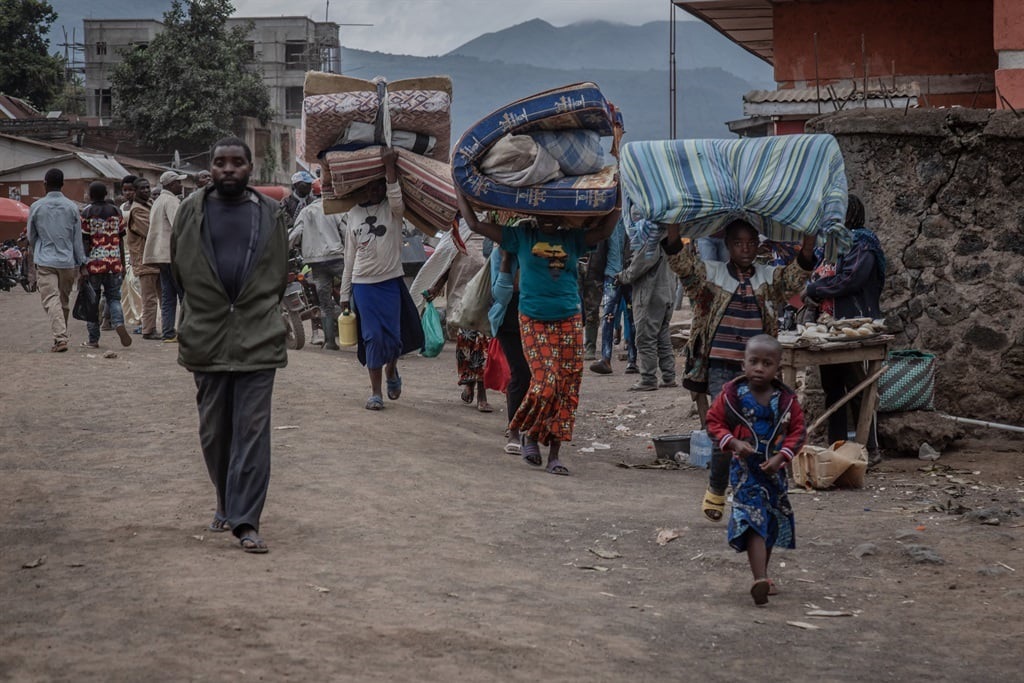
People crossing the DRC and Ugandan border with their belongings to seek refuge after clashes between the Congolese army and the M23, in Bunagana. Guerchom NDEBO
This was despite a ceasefire facilitated by the Angolan President João Lourenço entered on Tuesday by the two warring parties.
Speaking at a press conference on Friday in Geneva, United Nations High Commissioner for Refugees (UNHCR) spokesperson Matthew Saltmarsh said since January, Rwanda and Uganda have seen an increase in refugees from the DRC.
“More than 5 500 people have crossed the border into neighbouring Rwanda since January, and a further 5 300 into Uganda as insecurity and violence continue to ravage the border regions,” he said.
Rwandan President Paul Kagame stands accused of working with the M23 rebels.
On countless occasions, he has denied being involved with them. Instead, he blamed his DRC counterpart Felix Tshisekedi for using under his army, the Rwandese who committed genocide against Tutsi in Rwanda, and who committed crimes in DRC and who targeted Rwanda border with their shelling.
It is clear that by maintaining the Kivu insecurity, Tshisekedi is also failing to guarantee security ahead of elections due on 20 December in the DRC. Many people confirm that he would prefer to avoid elections because he may lose them.
The crisis in eastern DRC represents the largest internal displacement crisis in Africa. There are about 5.8 million internally displaced people (IDPs), and aid agencies don’t have enough resources to assist most of those affected.
“For 2023, UNHCR is asking for US$232.6 million (about R4.2 billion) to assist internally displaced people and refugees in the DRC. As of today, the DRC operation is only 8% funded,” said Saltmarsh.
With mounting numbers of the displaced their needs are “multiplying as already dire conditions deteriorate and resources in overcrowded locations buckle under the strain of new arrivals,” added Saltmarsh.
Depending on circumstances, in some areas, UNHCR officials have been “positioned to provide psychosocial counselling and community support to manage the traumas that displaced people are experiencing”.
In the weeks leading up to the peace deal, fighting had surged in the Kitchanga region in Masisi, near the strategic town of Sake in North Kivu, leading to record displacement in a week.
Saltmarsh added: Violence has particularly surged from the Kitchanga region in Masisi territory towards the strategically important city of Sake with 49 000 people displaced in the week of 17 February. In the locality of Kibirizi in Rutshuru territory, a further 20 000 fled during the week of 6 March.
Women and children are the most affected and were left with no choice but to sleep out in the open.
“Civilians continue to pay the heavy and bloody price of conflict, including women and children who barely escaped the violence and are now sleeping out in the open air in spontaneous or organised sites, exhausted and traumatised,” he added.
Since last year, the UNHCR said close to a million people have been displaced.
There are also reports of rape, extortion, kidnappings, and arbitrary killings recorded by the UNHCR.
Subscribe to view notification of our daily news
RwandaPodium © All Rights Reserved. Powered by thesublime.rw